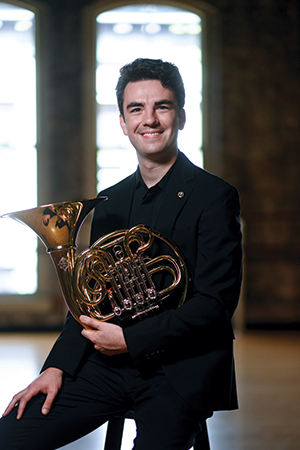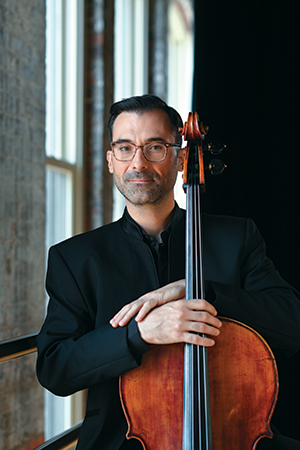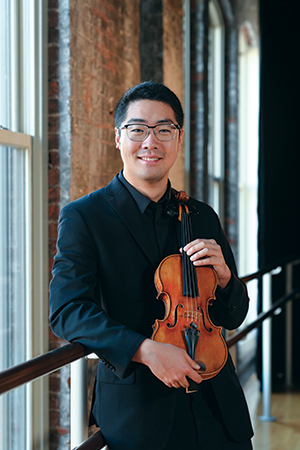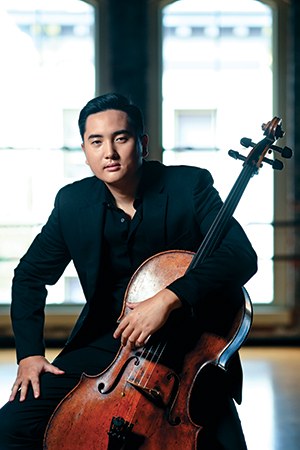New Musicians of the Orchestra
by DiDi Turley
This season, audiences will see eight new faces on Music Hall’s stage: four violinists, two cellists, a horn player and a bass trombonist bring their talents to the CSO. Woven within this issue of Fanfare Magazine are Q&A’s with the first four of those new players.
David Alexander
Hometown: Houston, Texas
Instrument: Horn

How did you get involved with playing horn?
When I was in elementary school, my best friend and I would play Rock Band and Guitar Hero. We’d put on little concerts for our parents where we’d wear leather jackets and gel our hair back. When I got to middle school, I had to take an arts elective. I saw band as an option and I thought, “Yeah, I want to play in a band!” I wanted to play drums, but my band director convinced me that my big head would be perfect for the horn because it would help the sound project or something like that. He really just needed horn players, but the rest is history.
What’s one Cincinnati staple you’ve tried and loved?
I accidentally tried goetta while I was here for my audition, actually! I was at my hotel the night before the audition and saw goetta sliders on the menu. I had never heard of goetta before, so I was just expecting regular burger meat. That first bite was a surprise, but it was really good!
What are you currently listening to?
Honestly, I don’t listen to music that much. I feel like my life’s pretty saturated with music. I’ll listen to repertoire that I have coming up, and I love all types of music. I just don’t really put it on in the background, you know?
Do you have any rehearsal or performance must-haves?
My water bottle is definitely my best friend when I’m on stage. Especially if I’m nervous, I tend to get dry mouth. I think it’s more psychological than anything—when nerves kick in, that little discomfort can become so noticeable. So, if you see me taking some extra sips, there might be a big horn moment coming up.
What’s something audience members may not know about your instrument?
There are dozens of different notes you can play with one fingering on the horn, to the point that you could play a whole scale without changing fingers. That’s why we tell everyone that it’s so easy to play wrong notes on the horn, but the flip side is that even if you throw down the wrong fingering you might still hit the right note! I’ve definitely flubbed my fingerings in critical moments and gotten away with it because of this.
If you had to play an instrument besides horn, what would you pick and why?
I would love to be able to play piano well. I took piano lessons as a kid, but I quit when my little brother got better than me. With horn, I can only play one note at a time but on piano, you can play harmony. It’s also a nice little party trick to sit down and play something at the piano. No one is super excited when someone pulls out a horn at a party.
Lachezar Kostov
Hometown: Plovdiv, Bulgaria
Instrument: Cello

How did you get involved with playing cello?
I was five years old, and in Bulgaria we would have certain testing done for musical aptitudes. I learned I was too old to start on a violin or piano—in Bulgaria at that time it was customary for students to start piano at age three and violin at age four. So the next best thing was cello. I decided to pursue it professionally around age 10, after giving my first recital. Everyone gave an enthusiastic ovation, which I now understand is customary for any children’s recital, regardless of how good they are. Regardless, that was the moment I knew it was the best thing I could ever do.
Were your parents supportive of your choice to pursue music?
Yes! My parents are both engineers, but my mother started learning cello with me so she could help me with my lessons. As a child, there’s only so much you can learn at once. Any parent can help their child with math, geography, but not every parent can help their child with music. So my mother learned to play.
What are you currently listening to?
Actually, if it’s not directly connected with my work at the CSO, I don’t listen to music at all. I do listen to a lot of audiobooks, though. I recently finished a book called Nexus: A Brief History of Information Networks from the Stone Age to AI by Israeli writer Yuval Noah Harari. I have a very eclectic taste in books, but not in music.
What’s one Cincinnati staple you’ve tried and loved?
One thing I found very exciting was going to Jungle Jim’s. Everybody had said that it’s exceptional, but I think everybody undersold it. I travel a lot—all over the world—and I’ve never seen anything like that, anywhere. There were even things from my home country, Bulgaria!
What are your rehearsal must-haves?
On my cello, I have something called posture pegs. If your string gets detuned, you have to use a special key-like tool on the peg to fix it. I make sure that I always have one on me. There was only one concert where I didn’t have one. I was playing principal cello with the Baltimore Symphony and one of my strings got loose. When I couldn’t fix it, I had to ask one of the last cellists in the section if I could borrow their cello and send them home.
What are you most excited about in the CSO’s 2024–25 season?
I’m sort of excited by every program, whether it’s something I’ve played a million times or something new, because the Cincinnati Symphony Orchestra is new to me. It’s really interesting and exciting to see how each piece is shaped by my colleagues, with myself included in that equation.
If you had to play an instrument besides cello, what would you pick and why?
I just bought a trumpet, actually, so that would be my choice! I really wanted to get my hands on a wind instrument, and I know colleagues from each instrument, so I’ve spoken to them about which I should try to learn. With oboe, you spend an exorbitant amount of time just dealing with reeds. Horn can be finicky. So, I bought a cheap trumpet.
Jonathan Yi
Hometown: Louisville, Kentucky
Instrument: Violin

How did you get involved with playing violin?
I started playing the violin when I was five. My mom grew up loving the piano, but my parents were both immigrants, so they didn’t start with a lot of money. We couldn’t afford a piano, but we could afford to rent a violin. I started taking lessons and it all went from there.
Did you know any of your fellow new CSO musicians before winning your position?
I had the same teacher as Joseph Okubo, another one of our violinists, which is crazy. When we were kids, we would have back-to-back lessons at our teacher’s house. We’ve had the same teacher three times now, and we went to high school together. We were stand partners for two years! Now that we’re adults, Joseph and I have seen each other at, like, every audition on the circuit. It’s just crazy that, for both of us, this orchestra was the one that stuck. It is magical. Our high school teacher was thrilled.
What is your post-concert routine?
I really enjoy my ride home. I get to sit in my car and reflect on things that I thought went well and what I could have done better. No matter how good a musician you are, there’s always room to improve. I’ll earmark a couple things mentally and ask myself, “Why didn’t that go well? Did I not practice this well enough? Why did this go a certain way?”
What is the best piece of advice you’ve received from a musical mentor?
One of my teachers told me to never allow fear to control my actions or decisions. I think that has gone further than any other advice I have received. It comes up when I’m on stage and I have to hit a really high note I want to shy away from, and it comes up in auditions. I’m always reminding myself not to let my doubt and insecurities get in the way of the hard work I’ve put in. I work really hard, but it’s not, you know, open heart surgery. It’s okay to play or live without fear.
What are your rehearsal must-haves?
I always make it a point to carry a tin of Altoids to share with people! It’s one of those simple things, right? Sharing is one of those things that brings a good energy to the room.
What is one Cincinnati staple you’ve experienced?
Every time I’ve had the chance, I’ve gone over to the Skyline Chili near Music Hall. When I went for the first time, I was like, “Oh, my God. What is this?” My mind was blown. I couldn’t believe it. I really, really enjoy Skyline Chili.
If you had to play an instrument besides violin, what would you pick and why?
If my musician friends see this, they’re never going to let me live it down, but I think I would love to play the cello. I love the sound of the Cincinnati Symphony Orchestra’s cello section, and, over the past couple of years, it just happened that all my best friends were cellists. I think cello is just such a gorgeous and versatile instrument.
Jerry Xu
Hometown: Changzhou, China
Instrument: Cello

How did you get involved with playing cello?
I actually started on the violin at age three. And then at age seven, I injured my hand, so I had to take a two-month break. When it was time to start playing again, my dad was like, “Oh, cello is so much cooler, because it just sounds like a human voice.” So, I switched to cello.
What is the best piece of advice you’ve received from a musical mentor?
As a student, it’s so important to note the details that orchestral players must pay attention to. When we study to play as soloists, we don’t always put our energy into mastering the different kinds of articulations and sound color that an orchestra member would focus on. When you’re focused on playing solo repertory, you have so much freedom, but taking the time to notice those details can really make or break an orchestra’s sound.
What do you do when you aren’t playing music?
Besides playing basketball and being a Golden State Warriors fan, I play video games quite a lot. My favorite at the moment is either Counter-Strike 2 or Battlefield. I find that playing games, especially with a mouse and keyboard, helps with my coordination, which helps me play better! Having the ability to visualize where you want your arm or hand to go without having to stop and think about it is incredibly helpful with playing the cello.
What are you currently listening to?
I love film scores, so I listen to a lot of Jerry Goldsmith’s work. The writing just brings out a lot of emotions; plus, it’s some of the only modern orchestral music that is truly familiar to the general public. I think film scores are the first place that a lot of people hear an orchestra’s sound.
From where do you draw the most inspiration when you’re playing?
I love to listen to opera for inspiration. Right now, Pavarotti is my favorite. I also love Cecilia Bartoli. Their vibrato is spot on for how I’d like my playing to sound.
If you had to play an instrument besides cello, what would you pick and why?
I would pick either horn or trumpet. They both have such heroic sounds while sharing an emotional depth and brilliance. Many of my favorite composers write the best lines for them!